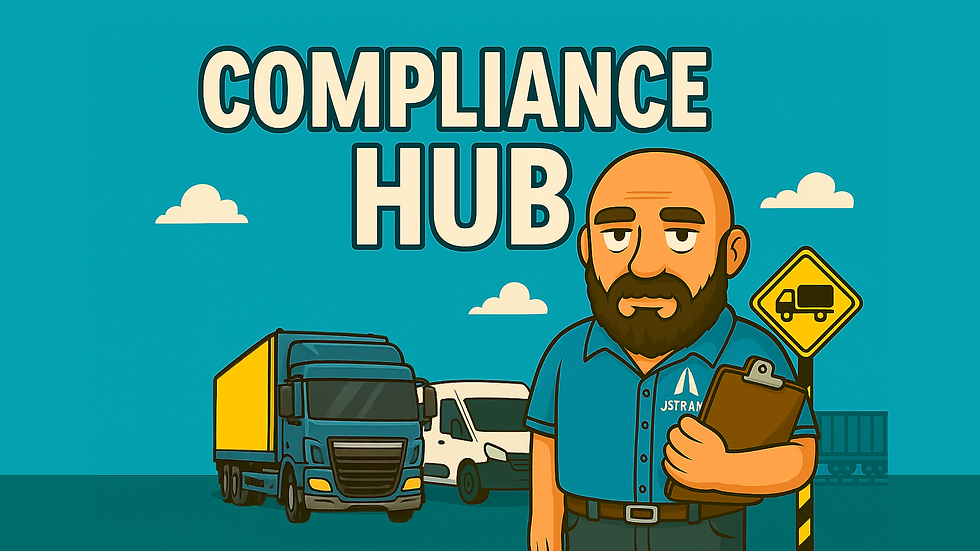How to Set Up Your Books for Operator Licence Compliance
- stuart47304
- Jul 14, 2025
- 4 min read

When most transport operators think about compliance, they picture walkaround checks, maintenance schedules, or tachographs.
But there’s another crucial area that often gets overlooked: your books.
Whether you're a sole trader with one van or running a small fleet under a Restricted
Licence, your financial records need to be accurate, accessible, and ready for inspection. The Traffic Commissioner and DVSA expect you to demonstrate not just operational competence — but financial control too.
In this guide, we’ll walk you through:
Why good bookkeeping is a compliance requirement
What financial records you must keep
How to set up a simple system
Digital vs paper records
Common mistakes to avoid
Tips for small operators and one-person bands
Let’s get your books roadworthy.
📚 Why Bookkeeping Matters for Licence Compliance
The Office of the Traffic Commissioner expects all licence holders to demonstrate:
Financial standing (available funds)
Financial stability (ability to operate safely)
Good repute (responsibility, transparency)
Poor or missing financial records can result in:
Licence application delays
Suspicion during DVSA checks
Call to Public Inquiry
Loss of repute — and ultimately, loss of your licence
Even Restricted Licence holders must meet this standard. Having no transport manager doesn’t mean you can neglect your admin — it means you’re responsible.
✅ What Financial Records Must You Keep?
Here’s what every Operator should maintain:
Record Type | Why It’s Important |
Bank statements | To prove financial standing and cash flow |
Invoices (sent and received) | To track income, expenses, and VAT (if registered) |
Receipts | Evidence of payment for fuel, maintenance, tolls, training, etc. |
Payroll records | Proof of wage payments, PAYE compliance |
Tax filings | HMRC Self-Assessment, VAT returns, Corporation Tax if limited |
Loan or finance agreements | If used for vehicles or business support |
Overhead bills | Rent, insurance, software, etc. |
Mileage or fuel logs (if claimed) | Supporting documentation for expense claims |
If called to a Public Inquiry or audit, you may be asked to produce this within 7–14 days.
🧾 How to Organise Your Financial Records
There’s no one right way — but your system must be:
Structured (easy to follow)
Consistent (same process every month)
Backed up (digital is safer than paper)
Accessible (not in a shoebox under the seat!)
Option 1: Manual (Spreadsheet-Based)
Best for sole traders or very small operators
Tool Needed | Use |
Excel or Google Sheets | Monthly income/expense log |
Cloud folder (Google Drive, Dropbox) | Store PDFs/scans of receipts and statements |
Scanner app (e.g. Adobe Scan, Microsoft Lens) | Turn paper receipts into PDFs |
Create folders by month and category:
/2025/Jan/Invoices
/2025/Jan/Receipts
/2025/Jan/Bank Statements
This lets you find anything in seconds.
Option 2: Cloud Accounting Software
Best for operators with multiple vehicles or staff
Software | Features |
FreeAgent | Ideal for sole traders, integrates with HMRC |
QuickBooks | Industry standard, bank feeds, VAT returns |
Xero | Robust for growing fleets |
Sage Cloud | Suitable for small to medium operators |
Most offer:
Automatic bank feeds
Invoice and payment tracking
Receipt capture (via phone camera)
VAT and tax calculations
Simple financial reports
Costs range from £12 to £30/month — often worth the time saved.
📊 What Reports Should You Be Able to Generate?
If asked by the DVSA or Traffic Commissioner, you should be able to show:
Report Type | Purpose |
Profit & loss | Shows whether your business is viable |
Cash flow forecast | Predicts future solvency (key for planning maintenance and proving financial standing) |
Balance sheet | Optional, but helpful to understand assets/liabilities |
Bank statement summary | Confirms available funds against licence requirement |
🧩 Don’t Forget These Key Compliance Links
Bookkeeping also ties into other compliance areas:
Area | Related Financial Evidence |
Maintenance | Repair invoices, PMI costs, garage contracts |
Driver compliance | Training cost records, licence check fees |
Insurance | Payment records, renewal letters |
Operating centres | Lease agreements, business rates invoices |
Financial standing | Original bank statements within 30 days of licence actions |
⚠️ Common Mistakes to Avoid
Mistake | Consequence |
No backup of paper records | Lost in fire, flood, or inspection failure |
Mixing personal and business funds | Financial standing harder to prove |
Failing to invoice consistently | Cash flow gaps and missed income |
Not logging cash expenses | Underreporting costs and losing tax deductions |
Leaving everything to year-end | Missed insights, poor decisions, and compliance risk |
🛠️ Quick Setup Checklist
✅ Create dedicated business bank account
✅ Choose a record-keeping system (manual or software)
✅ Set monthly schedule to update records
✅ Scan and store all invoices/receipts in date order
✅ Monitor financial standing monthly
✅ Keep 6+ years of records (especially VAT and tax)
👨💼 Do You Need an Accountant?
Not always — but you should have one on standby if:
You’re VAT registered
You employ staff
You’re limited and must file accounts
You’ve been called to a Public Inquiry
You want advice on tax efficiency
Even for a sole trader, a bookkeeper or tax adviser can help keep your records clean and audit-ready.
🧠 Final Thoughts
Keeping your books in order isn’t about box-ticking — it’s about:
Making better business decisions
Avoiding compliance slip-ups
Preparing for DVSA inspections or Traffic Commissioner scrutiny
Building a stronger, more resilient operation
Start simple, stay consistent, and use digital tools wherever possible. If you ever need to prove financial standing or operational responsibility — your books are your best defence.
Next in the series:👉 Setting Up a Maintenance Regime for Restricted Licence Holders
